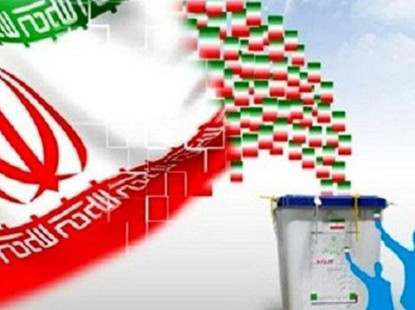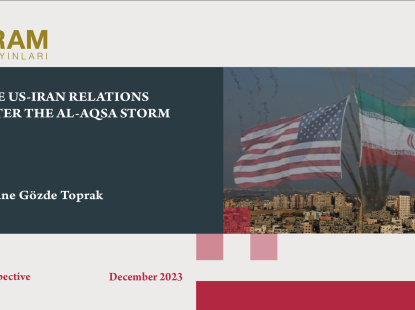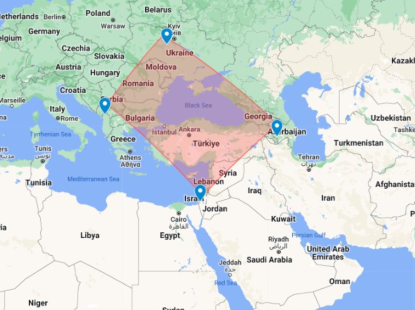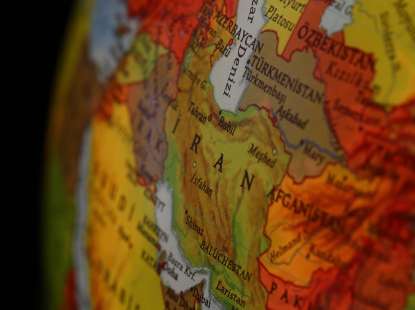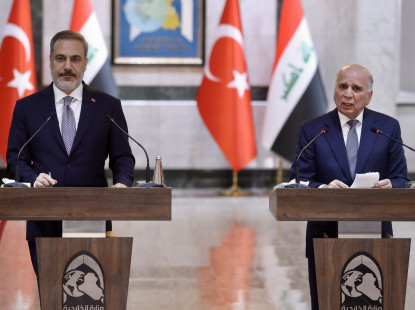Libya: Efforts towards Building an Alliance against Turkey in the Mediterranean
Having a geopolitical proximity to the country, Libya has turned into a new area of conflict against Turkey. Turkey has been conducting close relations with the Libyan Government of National Accord which has international legitimacy and Fayez al-Sarraj as its leader. However, on November 27th, 2019, with the military-technical deal made in Istanbul with the Government of National Accord, a new process has started for the Libyan policies regarding an arms supply and if necessary a military support.
The purpose behind the measures taken by Turkey in this regard was to thwart the efforts of both the Commander of the Libyan National Army Khalifa Haftar and the actors behind him, whose aim was to take full control of Libya. Turkey playing an active role in the process of Libya had resulted in the halting of the forces of Haftar who had been trying to seize the capital city Tripoli since April, 2019, and also deterred the actors behind Haftar from implementing their plans. On the other hand this policy resulted in mobilizing some regional actors against Ankara.
Russia Withdraws from the Area
The most important supporters of Haftar are: the UAE, Saudi Arabia, Egypt and Russia. However, as seen in the Idlib crisis, Russia was the most prominent among these nations. Especially since the strengthening of Haftar, Russia started to take part in the Libyan process. Despite the official statements made by Russia that describe its involvement in the country as establishing peace and stability without taking any sides, Russia has been in close relations with Haftar for years. It is also known that, Vagner provided support to the forces of Haftar through a private military company.
The Russian Minister of Defense Shoygu had meetings with Haftar on January and August 2017, on May and November 2018, and on February 2020, most of which took place in Moscow. In April 2019, before launching the military operation against Tripoli, Hafter requested military support from Russia. In March 2019, approximately 300 mercenaries were sent to Benghazi in order to support Haftar. In addition to military consultants and mercenaries, Russia provided Haftar with airplanes, artillery systems, tanks, drones, and ammunition. On April 4th, Haftar made the decision to launch an attack against Tripoli. The April 8 UNGA resolution on stopping the attacks was vetoed by Russia. Although the forces of Haftar could not seize Tripoli, the forces took control of some of the critical regions from under the control of the Government of National Accord. In September 2019, after Russia sent about 100 mercenaries to Libya, Haftar’s forces relaunched the attacks against Tripoli.
Providing extensive support to Haftar, Russia has become one of the most important actors in Libyan politics. As the need for Russia increased, Moscow started to take bolder steps in the region. Devising its Libyan policies upon Haftar, Russia began to feel disturbed by Turkey’s Libyan policies. So Russia launched the Idlib operation in coordination with the UAE and Saudi Arabia as a response to Turkey’s support to the Government of National Accord and to prevent Turkey from administering its policies concerning Libya, but failed. Aiming to avoid a confrontation, Russia conceded to Turkey’s interests in Idlib and Libya. With the Moscow Agreement, Russia was forced to limit its activities in both Idlib and Libya. In fact, one of the important objectives Turkey has been pursuing with its policies in Libya was to ensure that Russia remains neutral in the Libyan issue, which was accomplished with Moscow Agreement. Therefore Turkey succeeded in distancing Russia from the UAE-Saudi Arabia-Egypt alliance.
The Arabian Trinity: Egypt, the UAE, and Saudi Arabia
Egypt is another crucial actor carrying out strenuous efforts in its activities against Turkey. Providing military and political support to Haftar, Egypt deems Libya as its own domain of activity. It aims to gain full control over Libya through Haftar. Having a scarce amount of underground resources and a population of 100 million, it provides great advantage for Egypt in terms of economic and national interest to hold control over its neighbor that has rich resources of oil and natural gas and a population of 6.5 million. Also, Egypt is in competition with Turkey in the Eastern Mediterranean region, as it is in Libya. Having been conducting cooperation with Russia and creating an alliance with the UAE since el-Sisi came to power, Egypt has been pursing a policy of increasing and solidifying regional alliances in order to restrict Turkey’s political influence over the region. In March, the Egyptian Head of Intelligance Abbas Kamel made secret visits to Morocco, Algeria, Tunisia, Syria, and Sudan. The purpose behind these visits was to restrict Turkey’s increasing influence in the Middle East and the Northern African regions. Consequently, he made an offer to these countries about making a cooperation agreement for the purposes of security.
Another actor, competing for power as a supporter of Hafter in Libya, is the UAE. Similar to Egypt, the UAE provides extensive support to Haftar, whether it is political, military, or economic. It delivers weapons both directly and by transit through Egypt. Previously, the UAE supplied the Russian-made, medium-range “Pantsir Air Defense System.” However, because these systems remained inferior to the Bayraktar TB2 drones provided by Turkey to Libyan government, the UAE started delivering the Israel-made air defense systems instead of the Pantsir. Therefore, Israel who has been collaborating with Greece, Egypt, and the GASC in the mediterranean and claiming that it officialy does not take any sides, got indirectly involved in the conflict because of the UAE. Besides, the UAE got Chine involved in the Libyan issue, albeit indirectly, by deploying the Wind Loong II heavy drones bought from China into the conflict zone in Libya.
Like Russia, Saudi Arabia profited from the crisis in Libya as well. Saudi Arabia was at the forefront of the Arab League countries that participated in the 2011 Libya intervention. The Libyan civil war and the never-ending conflicts caused the country to remain outside the international energy market. Saudi Arabia has two purposes in Libya: one being the inclusion of Libya into its own energy projects by obtaining full control over Libya through Haftar and Egypt and the other being the exclusion of Libya from the energy projects by ensuring the continuation of instability in the country. On the one hand, for this purpose, similar to Syrian issue, Saudi Arabia is supporting armed Salafi groups in order to increase instability in the country. On the other hand, claiming that it is struggling against such groups, it engages in the politics of these countries. Employing the same method, Haftar’s forces too, conduct close relations with the Salafi groups supported by Saudi Arabia and the UAE while claiming that it struggles against terrorism with the purpose of obtaining international legitimacy.
The Alliance of Proxy Forces: Haftar and Assad
Having the quality of being proxy forces of the external actors, Haftar and Assad are also in pursuit of forming an alliance against Turkey. In this context, on March 3, an agency was opened with a ceremony in Damascus for the first time. The Damascus administration described this development as a great step towards a collective struggle against Turkey. The fact that the Haftar, as the proxy force of the UAE, Saudi Arabia, and Egypt, got closer to Damascus as the proxy force of Russia provides a great opportunity for Damascus. Having been excluded from the Arab world since 2011-2012, due to its enmity towards Turkey, the Damascus administration has now obtained the chance to establish close relations with the prominent Arab countries such as the UAE, Saudi Arabia, and Egypt through Haftar. Both for Haftar and the trinity of the UAE-Saudi Arabia- Egypt, their relations with the Damascus administration is actually a means for rendering Turkey’s Libyan policy unsuccessful by creating new areas of conflict and causing new problems for Turkey in Syria. In addition, another function of the Damascus administration is to gather Syrian militia for Haftar’s forces, 60% of whose ranks consist of foreign militia.
In conclusion, the regional actors failed to render Turkey’s regional policies unsuccessful despite their allies. So they are trying to increase their ranks by soliciting the support of more countries to accomplish their purpose. Their efforts have not yet been able to provide results and so Turkey’s agreement with Russia is significant in this sense. So it is important that this agreement continues in the sense that the states in question are/can be endeavoring in various ways to create new areas of tension between Turkey and Russia. With this in mind, Turkey can make new initiatives in order to thwart the attempts to form an alliance against itself from bearing fruit. Trying to distance Israel from the axis in question is a possible example to such initiatives.
- Tags:
- Libya
- Turkey
- UAE
- Saudi Arabia
- Russia




